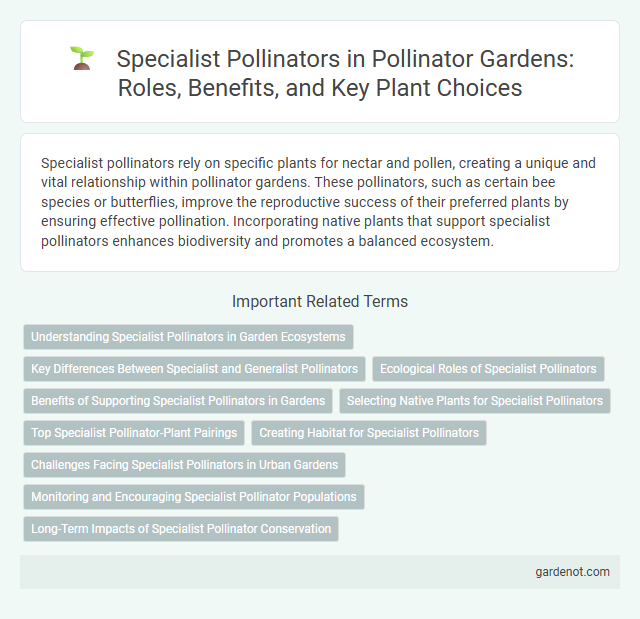Specialist pollinators rely on specific plants for nectar and pollen, creating a unique and vital relationship within pollinator gardens. These pollinators, such as certain bee species or butterflies, improve the reproductive success of their preferred plants by ensuring effective pollination. Incorporating native plants that support specialist pollinators enhances biodiversity and promotes a balanced ecosystem.
Understanding Specialist Pollinators in Garden Ecosystems
Specialist pollinators, such as certain bees and butterflies, exclusively visit specific plant species, playing a crucial role in maintaining the biodiversity of garden ecosystems. Their specialized relationship ensures effective pollination and promotes the reproduction of targeted plants, enhancing garden health and resilience. Understanding these interactions helps gardeners support native pollinator populations by planting appropriate host plants and creating optimal habitats.
Key Differences Between Specialist and Generalist Pollinators
Specialist pollinators, such as certain bees and butterflies, exclusively visit specific plant species, enhancing pollination efficiency and plant reproductive success within their niche. In contrast, generalist pollinators, including honeybees and hummingbirds, forage from a wide variety of flowers, promoting broader ecosystem resilience but with less targeted plant-pollinator interactions. The key difference lies in the specialization degree, where specialists depend heavily on particular flora, making them vulnerable to habitat changes, whereas generalists adapt more readily to diverse floral resources.
Ecological Roles of Specialist Pollinators
Specialist pollinators, such as certain bee and butterfly species, have evolved to exclusively pollinate specific plant species, ensuring highly efficient pollen transfer. Their ecological roles include maintaining genetic diversity within plant populations and supporting the reproduction of rare or endangered flora. This mutualistic relationship enhances ecosystem stability by promoting plant species that rely on these pollinators for survival.
Benefits of Supporting Specialist Pollinators in Gardens
Specialist pollinators, such as certain bees and butterflies, rely on specific plants for nectar and pollen, enhancing garden biodiversity and ecosystem resilience. Supporting these pollinators in gardens promotes targeted plant pollination, leading to higher seed and fruit production for native flora. Creating habitats rich in native plants and avoiding pesticides ensures the survival of specialist pollinators, crucial for maintaining balanced local ecosystems.
Selecting Native Plants for Specialist Pollinators
Selecting native plants for specialist pollinators supports their unique life cycles and dietary needs by providing essential nectar and pollen sources. Specialist pollinators, such as the monarch butterfly or certain solitary bees, rely on specific native flora for reproduction and survival, making native plant diversity crucial for their conservation. Cultivating these plants enhances habitat connectivity and promotes biodiversity within pollinator gardens.
Top Specialist Pollinator-Plant Pairings
Specialist pollinators like the Yucca moth and yucca plant form exclusive mutualistic relationships critical for both species' reproduction. The fig wasp and fig tree exhibit a coevolved partnership where the wasp pollsinates the fig's flowers while completing its life cycle inside the fruit. Another key specialist pairing is the orchid bee with certain orchid species, where unique floral structures ensure pollination by a limited bee population, enhancing ecological stability in pollinator gardens.
Creating Habitat for Specialist Pollinators
Creating habitat for specialist pollinators involves planting native flora that cater specifically to the dietary and nesting requirements of these species. Providing host plants crucial for the larvae of specialist pollinators, such as certain butterfly and bee species, enhances local biodiversity and supports their life cycles. Incorporating diverse, region-specific flowering plants ensures continuous food sources, promoting the survival and proliferation of specialist pollinators.
Challenges Facing Specialist Pollinators in Urban Gardens
Specialist pollinators in urban gardens face challenges such as habitat fragmentation, limited availability of specific host plants, and exposure to pollutants. Urban development disrupts nesting sites and reduces floral diversity critical for their survival. Conservation efforts must prioritize planting native flora and creating continuous green spaces to support these specialized species effectively.
Monitoring and Encouraging Specialist Pollinator Populations
Specialist pollinators, such as certain bee and butterfly species, play a critical role in pollinator gardens by targeting specific plant species for effective pollination. Monitoring specialist pollinator populations involves tracking their activity patterns, nesting habits, and plant preferences using methods like direct observation and remote sensing technology. Encouraging these populations requires planting native flora that matches their dietary needs and creating habitats that support their life cycles, thereby enhancing ecosystem biodiversity and crop yield.
Long-Term Impacts of Specialist Pollinator Conservation
Specialist pollinators, such as certain bee and butterfly species, play a critical role in maintaining plant biodiversity within pollinator gardens by exclusively pollinating specific native plants. Conservation of these specialist pollinators enhances ecosystem resilience and promotes genetic diversity, supporting long-term ecological stability. Protecting their habitats reduces the risk of species decline and ensures sustained pollination services essential for native plant reproduction.
Specialist pollinator Infographic

 gardenot.com
gardenot.com